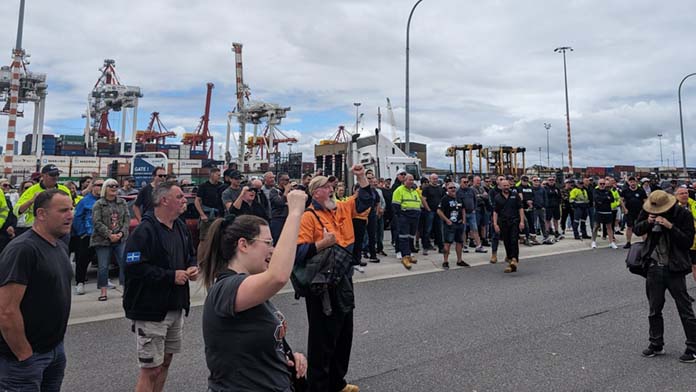After more than four months of determined industrial action, wharfies at DP World port terminals have won a 25.6 per cent pay rise over four years, while accepting changes to rostering.
The in-principle four year agreement between the company and the Maritime Union of Australia (MUA), was concluded in three days of “facilitated negotiations” in the Fair Work Commission (FWC).
DP World’s media campaign, complaining of a massive backlog of containers left on the port and damage to the wider economy, fell flat as the government refused to intervene and suspend industrial action.
All protected industrial action has now been withdrawn. But the deal is yet to be drafted or voted on by the workforce, and local “Part B” negotiations are still taking place about issues relating to individual ports. The MUA is urging workers to vote yes to industrial action in a new ballot, in case the dispute re-erupts in the drafting process.
Wharfies will receive an 8 per cent pay rise in the first year, then in subsequent years 7 per cent, 4 per cent, and 4.5 per cent. There is a $2000 sign-on bonus, but no backpay.
This wage increase will help workers catch up on inflation and the increasing cost of living, although it is not explicitly linked to the inflation rate as a bare minimum, as at the Patrick terminal.
The package also includes triggers for conversion to the permanent roster, phasing out the “short shifting” practice of late finish straight into an early start, and improvements around delegates’ rights, safety, automation, graduated retirement, termination, selection criteria for promotion and more.
Given the recent history of EBA negotiations dragging on for years, achieving an in-principle agreement in four months is a positive step forward.
This was only possible due to the willingness to take serious industrial action.
Workers took a combination of 24 hour strike days, two hour stoppages at the end of each shift, eight hour delays on vessels, strikes on particular shipping lines, and alternating bans on road/rail and vessel operations.
The union have emphasised the deal as a win for “fair pay, safety and work-life balance”.
The workforce beat back DP World’s desired “five x three roster”, which would have completely changed the existing roster, and cut the rate at which entitlements like annual leave and superannuation are paid.
But roster negotiations in some terminals are still a sore point. In Sydney a 36 hour roster was reduced to 35 hours, but with extra nights and weekend work.
Some workers are still pushing for changes to soften the most undesirable parts of the new roster.
Another concession was that personal leave/sick days will have to be accrued throughout 12 months, instead of granted at the beginning of the each financial year, meaning that workers cannot manage their own sick leave and risk being without paid leave if they fall seriously ill or have to take extended time off for operations or injuries.
Anti-strike laws
The workforce and union were determined to go hard out the gate, knowing that Labor’s new “intractable bargaining” laws would set in after nine months, and the whole dispute could be arbitrated by the Fair Work Commission.
But the union also dropped their goal of signing only a two year agreement, so that workers can fight for improvements more often.
The fact that DP World and opposition leader Peter Dutton tried to pressure the Labor government to intervene and take away workers’ ability to take strike action just shows that every attack on our right to strike will only make the bosses and the right call for more.
Labor made a virtue of refusing to intervene at DP World, but has maintained laws that help the bosses, like the intractable bargaining laws and the anti-strike laws that restrict strikes to bargaining periods and prevent industrial action across the wharves.
Workers at DP World have shown that concerted industrial action can win big gains on pay.
But winning clear cut victories over the bosses will require a willingness to defy the anti-strike laws, the Fair Work Commission and the threat of forced arbitration.






